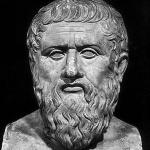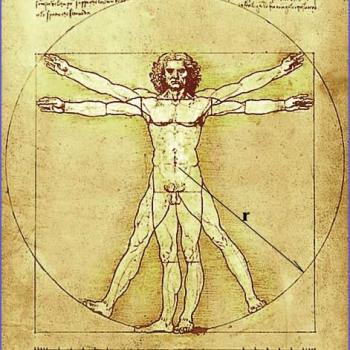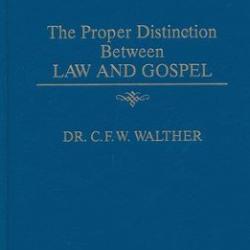
Post by Nathan Rinne. Please note: Pastor Wilken’s comments are in blue alone. The rest is my voice.
First of all, if you need a primer on Radical Lutheranism – the term first coined by the late Lutheran theologian Gerhard Forde – you can see this piece that I wrote, explaining why every Christian should be tempted by it!
Nevertheless, don’t be too tempted! — it has its problems. For instance, you can get a taste of them in this interview that Pastor Todd Wilken, of the theological talk show Issues ETC., did with Jack Kilcrease (found on this page – Kilcrease’s is a more sympathetic critique) about Gerhard Forde.

One of the Radical Lutherans’ big claims is that later Lutherans domesticated Luther and put him in a straightjacket of sorts. It is they who go back to the vintage, authentic Luther. My guess is that most if not all of the authors of the book The Necessary Distinction: a Continuing Conversation of Law and Gospel would say the same thing (in addition to Martin Luther getting it right where every other person in church history had been wrong!).
I would contend however, that Martin Luther’s Antinomian Disputations, unpacked in my recent series Luther’s Antinomian Disputations for Dummies, should cause anyone to doubt this claim. And Pastor Wilken has also been critical of Radical Lutheranism himself. See, e.g. the talk referenced here by Pastor Cooper and looked at more closely on the Steadfast Lutherans blog.

In this post, I am going to look in more detail at the points that Pastor Wilken made in his talk critiquing Radical Lutheranism in light of my recent study of Martin Luther’s Antinomian Disputations. Since I think Pastor Wilken’s first ten points are his strongest ones, I focus on providing longer comments on those, usually with more sound bite-length comments for the last nine. The immediate text below and numbered comments in blue below are Pastor Wilken’s. My commentary is interspersed between these.
The teachings of Radical Lutheranism can be recognized by any combination of the following ideas:
- Sin is reduced to self-justification. The only thing sinful about any thought, word or deed is that it is an attempt to justify oneself before God.
The antinomians in Luther’s day evidently believed that because of Christ’s work, no sin actually remained in the Christian. Therefore, the law was no longer needed. In Radical Lutheranism, sin does remain in the Christian and the law is still needed, but almost always only to convict persons of the sin of trying to earn their salvation before God by being overly concerned about avoiding specific sins and the like. Even though the antinomians of Luther’s day talked about following Christ’s example, they also mocked those overly concerned about particular sins. For the Radical Lutheran, in the end, one often gets the impression that the people who think that they should both be concerned about actual sins and that God’s law should be proclaimed vs. actual specific sins are the only persons who God is really angry at. In other words, since non Radical-Lutherans do not realize that God is not really angry at the world (in Forde’s account, Jesus’ death was not even to atone for their sins!), and so also not angry at them, He is now, in some sense, angry at them for rejecting his goodness (unless the Radical Lutheran is also a universalist, which, yes, we also should be tempted by).
- The Christian’s struggle against sin is replaced with a struggle against feelings of guilt.
The antinomians of Luther’s day simply wanted to avoid being condemned and convicted by God’s law (preferring more subtle ethical instruction from Christ’s example – being both less direct and not merely propositional).
What Wilken says directly above though does indeed seem to be what happens in Radical Lutheranism – if a specific sin is talked about, it tends to be the sin of “self-justification,” deriving from original sin, mentioned above. Along with this comes the idea that it makes sense for the Christian to be humble about what he believes about God and particularly God’s law. In Luther’s day, no one questioned that guilt was incurred for actual sins but the guilt of original sin was, for many, in doubt (possibly with the antinomians of Luther’s day as well, though they would have protested this). Again, today’s Radical Lutherans have the opposite problem, with, it seems, many an actual sin being all that is thrown into doubt (or simply being regarded as irrelevant).
While surely not all identifying with Radical Lutheran theology want to toss out God’s law, those who do have a friend in its theology, with its more “hijack-able” system. Focusing on guilt instead of sins allows “old sins,” like traditional sexual immorality, to be replaced by “new sins” like “homophobia,” and all in the name of spiritual humility. More progressive Christians do not even have to say, with the postmodernists, that there is no truth or that truth is evolving, because instead of focusing on the Bible as God’s word they can appeal to something like Platonic ideas. In other words, they can appeal to something like “unchanging Forms in the heavenly realms (or in the mind of God)” that we, as we progress in sanctification (their definition), are coming to better realize and understand with the help of one another (in a “Hegelian dialectic” fashion). Christian thought, in their view, has evolved regarding things like polygamy (well, we’ll see), slavery, and now, marriage and gender.

- The Christian’s struggle against sin is described as, at best futile, or merely an attempt at self-justification.
Against the antinomians of his day, Luther spoke gravely against their security – how they ridiculed sin, smiling and smirking, treating “innumerable evil desires to be a joke and a game” (SDEA 253). On the contrary, “it certainly is the duty of a preacher to say that lusts, wantonness, greed, and cheating someone else is sin and that God will punish it, even with eternal death” (SDEA 289). But with Radical Lutheran theology at the helm – where no sin is serious enough to demand atonement – things like cohabitation, lustful thoughts, drunkenness, what one watches or views, and the use of the profanity are, to say the least, far more likely to be seen as far less serious than previous generations of the faithful have judged.
Of course, self-justification and the other sins deriving from it – various legalisms – should be avoided by all means. Again, it is far more likely that Radical Lutherans or those sympathetic to them will even find doctrines like the Real Presence and corresponding practices like those of closed communion – meant to protect safeguard the richness of the simple and humble message of the Gospel (Christ’s real body and blood given and shed for you!) and those partaking of Christ’s body and blood – as evincing this legalism.
Very interestingly, Luther suggests that it is not so much what Christians believe – in this case about God’s law – that the world finds problematic, but rather its willingness to act on its beliefs, which we all know tends to, uncomfortably, reveal divisions and distinctions among persons. To the idea that Eph. 2:14 suggests the wall destroyed by Christ is his law, Luther responds as follows:
“And here Paul speaks about the law of Moses proper, not about the Decalogue, since the latter pertained to all nations. For the nations did not hate the Jews because of the Decalogue, but because they separated themselves from the remaining nations by way of unique worship and ceremonies, and called themselves alone the people of God, all the others they called atheists and unbelievers. The quarrel was about the temple and the ceremonies. Yet finally Christ came and destroyed this obstruction and Jews and Gentiles were made one. But if the Decalogue is referred to, it is well, and it is here removed, and destroyed insofar as it is damnation, through Jesus Christ, our Lord. Amen.” (ODE, 123)
- The Holy Spirit’s uses of the Law are usually abandoned one by one (usually in the order of 3, 1, 2)
3 = law as a guide (to guide the Christian who remains a sinner), 2 = law as a mirror (“bringing down to hell,” to condemn), and 1 = law as a curb (for civil society). In Luther’s day, the antinomians focused on the second, or condemning use of the law. They denied that the Holy Spirit had anything to do with this process, which Christ came to alleviate with his first coming. Perhaps today Satan attempts a less direct route, focusing on third use of the law. Here, conta everything we see in Paul’s letters, the idea is that it is wrong to exhort a Christian to behave in a certain way after they have been told that God puts away their sins (the only message, which when embraced by faith, grants and preserves us in eternal life). For the Radical Lutheran it is this which would not be the work of the Holy Spirit, but the devil himself. If you disagree, you are like Luther’s opponent Erasmus!
Ultimately, of course, Satan would like to eliminate the second use of the law, and so perhaps now he is content to play a longer game. In Luther’s day, perhaps he conceived he could be successful because of the growing popularity of Pelagian and semi-Pelagian theologies (salvation by works). Pelagians and semi-Pelagians have a weakened doctrine of original sin, and the Lutherans emphasized how the law accused us not only of sinning and particular sins, but of being sinners who failed at a very deep level: we are all rebels, enemies of God, etc. Without this doctrine, Christ is no longer needed.
- Contrition over sin is assumed, even in unbelievers. People are generally assumed to have a knowledge of, and guilty conscience over their sin.
This claim, which does indeed seem to be assumed by many Radical Lutherans, is simply not credible. In Luther’s Antinomian Disputations he admits that even in his day few are terrified by God’s law and that even when there is a little fear unbelievers in fact need more fear: “the law is also not so great that it could cast love—if it is genuine and not fake—out of your heart. But the more you fear, the more the law is to be urged, until you see that you do not love wholeheartedly as the law requires” (SDEA 167). Just because Luther insists that all persons have a natural knowledge of God, this should not be given too much weight. Luther reminds us that Paul knew much about God’s law and yet was not convicted of His persecution of God’s people. Furthermore, God had to republish the law through Moses in order to help people remember His will. Finally, Luther even makes the comment that a people can get to the point where they are “unnatural” – where the revealed and even seemingly natural knowledge of God seems far from them. There is always a sense in which they know and are still culpable, and yet, that knowledge is being suppressed to an unbelievable degree.
Even granted that some do experience a guilty conscience over sins they really are guilty for –and that God will bring to repentance and faith those who He has predestined for faith in good time – whatever different types of strategies they might choose, Christians nevertheless have an obligation to create an environment where the full counsel of God can be heard by the people of God and the world is welcome to hear it as well.
- The Law is confused with the pain and trouble of living in a fallen world. The Law may be described as any bad situation or evil occurrence in life.
It is important to note that when Luther says in the Antinomian Disputations “whatever shows sin, wrath and death exercises the office of the law,” and that “reveal[ing] sin is nothing else – nor can it be anything else – than to be the law of the effect and power of the law in the most proper sense,” what he does not say is just as important, namely, for example: “whatever produces sorrow” exercises the office of the law. Indeed, the matter of a good conscience and bad consciences, seared ones and hardened ones – intextricably related to the written law which correlates with the law written on man’s heart –should certainly be foremost in our mind here. We should not be giving the impression that books like this one by Tim Wengert — which purport to give an accurate view of what Luther taught regarding Law and Gospel — are actually helpful in any sense.
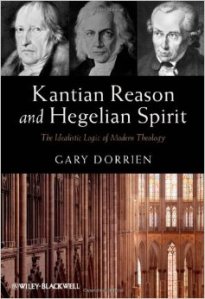
- The distinction between Justification and Sanctification is blurred in statements like “Sanctification is simply the art of getting used to justification.”
The main figure in Radical Lutheranism, Gerhard Forde, rightly pointed out how those who are justified and have peace with God are also those who are sanctified. It is most certainly true that those who are justified by faith have a faith that is alive – for they have also experienced the sanctifying power of the Holy Spirit (passive sanctification). This said, what, ultimately does it mean to say that “sanctification is simply the art of getting used to justification?” Does it mean that we can say that in this and because of this new relationship with Christ by faith, we begin to act according to the law by loving God and neighbor — and that this flows with and not against the 10 commandments? If not, why not? If the answer is “no” is it because, as regards the proper standard of conduct for the reborn, it can only be said to be their relatedness to Christ, which is not compatible with the unchanging will of God, the Ten Commandments? (“relatedness” vs. “law”).
My guess is that they are not going to like this “old school sanctification” definition provided by Robert Baker:
Sanctification (Greek, hagiasmos : (1) Consecration, purification ; (2) the effect of consecration, sanctification of heart and life. Thayer), in its theological use, denotes the progressive development of the regenerate life in the attainment of conformity to the divine law. It is described in the New Testament as being “conformed to the image of his Son,” the end of predestination (Rom. 8 : 29 ; 2 Cor. 3:18); being “transformed by the renewing of your mind” (Rom. 12 : 2) ; “putting on the new man” (Eph. 4 : 23, 24, etc.), besides the usual terms, “holy,” and “sanctify.” Sanctification admits of degrees, unlike justification and regeneration. It is distinguished from justification, also, by bringing an actualized righteousness, while justification brings an imputed righteousness; from regeneration, as this is the impartation of the new life in its beginning, while sanctification is the increase and consummation of the new life. The standard of sanctification is the law of God, particularly as that law is embodied In the life of Christ. Its essence is love (Rom. 13 : 10 ; Col. 3 : 14). It involves the subordination and crucifixion of the “old Adam,” but not, in this life, the eradication of original sin. The error of those who teach otherwise, whether Rome, or an extreme and fanatical Protestantism, is based on a false definition of sin, and a confusion of sanctification with justification. The work of sanctification is effected by the Holy Ghost, the renewed spirit of the believer yielding to his guidance, and co-operating with him. The means of grace are here, as elsewhere in the kingdom of grace, the channel of the efficiency of the Spirit of God. C. A. M.
- Christian cooperation in Sanctification, clearly and carefully taught in the Lutheran Confessions, is equated with cooperation in Justification.
These are clearly not the same, as one can clearly tell from Martin Luther’s Antinomian Disputations. Whereas the unbeliever is in bondage, desiring to not submit to God’s will, the believer has a new heart, and therefore begins to desire good. The Romans 7 and Galatians 5 and I Cor. 9 battle that Paul describes can now actually take place. All thoughout his career, the reformer talked about the two natures of the Christian. For example, at the end of chapter 1 of his book, “On Christian freedom”, Luther says this:
“The reason why seemingly contradictory statements are often made in the Bible about Christians is due to the Christians two-fold nature. The simple fact is that within each Christian two natures constantly oppose each other. “The flesh wars against the spirit and the spirit wars against the flesh” (Gal. 5:17, “On Christian Freedom”).
Should we be talking about seeing this matter analogously to the issue of Jesus Christ and Christology? Should we be talking about the two natures of the Christian? Luther did not hesitate to do so, and few would accuse him of focusing on the Christian per se instead of Christ!
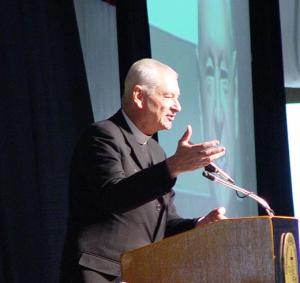
- Christian cooperation in Sanctification is depicted as resisting, rather than cooperating with the Holy Spirit.
If someone asks what a Christian contributes to their salvation, a good answer is “sin”. That however, is not a good answer when it comes to matters involving sanctification. I’m guessing that what Matthew Garnet talks about here is in the ballpark of what Pastor Wilken has in mind with his ninth point. Garnet asks the question “Does the pastor show you your sin through his preaching?” and goes on to reply:
“Problems to look out for here include the obfuscation of original sin as well as abstracting actual sin. One very famous Lutheran pastor, speaking on original sin in one of his podcasts asserted that anytime Christians try to be good people in accord with the commands of Scripture, they are re-enacting Adam’s fall. Because only God is good, he reasoned, to try and be good is trying to be like God. Thus, for this man, trying to be good is the essence of original sin. I’ve observed variations on this theme as well from other preachers and obviously, it is wrong.”
- Encouragement or instruction in Good Works is considered de facto legalism.
In their essay “The Hated God,” Steve Paulson and Nicholas Hopman say:
“The fundamental concern of a legal myth is to motivate hearers to take a journey that corresponds or collaborates with God (along with the various ‘co’s’ like covenant, contract, or ‘the Great Com-mision’ that all assume cooperation between divine and human for salvation). In this way, law is taken as God’s gift to provide direction in life (reciprocation). Grace is empowerment to fulfill law’s movement, which is what sinners want most from the story: what can we do to help?” (11)
Still, Luther, a guy who knew more than anyone about the “legal myths” and “ladder theologies” by which men seek to secure salvation before God, said this:
“Yet Christ,” [these antinomians] say, “has removed your sin. Why are you sad?” This is why they continue to do what they do in an utterly secure manner. They translate the merit of the passion of Christ and of the remission of sins into luxuriousness….
Christ fulfilled the law, but it needs to be added: “Later see to it that you lead a holy, pious, and irreproachable life, as it is fitting for a Christian. This is what you have heard so far: Be forgiven. But lest you complain that you are utterly forsaken, I will give you my Holy Spirit, who makes you a soldier; he will even produce mighty and unspeakable cries against sin in your heart, so that you thus finally do what you wish.” But am I not unable? “Pray that I may hear you, and I will make you able…” (SDEA 303, 305, italics mine)[i]
- The Law itself is viewed as the source of legalism, rather than man’s sinful misuse of it.
In short, the law doesn’t make people hate God. It reveals that sinful man, familiar with God’s qualities apart from the Gospel, can’t not hate God. Detail.
- Scripture’s warnings against falling away from the faith are minimized or ignored.
Luther: “Our Antinomians are so blind that they cannot recognize the doctrine of the law in Paul, e.g., in these obvious words (Phil. 4:8): “Whatever things are chaste, just, etc., these pursue.” Yet they do all things for that reason that they might render us secure and that the window might be opened for the devil in order to overthrow us unexpectedly” (ODE 156, SDEA 287, italics mine)
Again: “[I]t is necessary to admonish, to stir up, and to call as if to battle, so that they may remember in what danger they live. Don’t sleep, don’t sleep and don’t snore! Awake!” (SDEA, 263)”
It’s almost like we walk in danger all the way or something.
- Scripture is often searched to find the sinner, rather than the Savior.
As I once wrote: “… they also, seemingly unawares, often give the impression they think they are the ones who are mature.
They are not like, for example, legalistic, cowardly and insipid pastors stuck in the rut of seeking security! At the very least, these deserve to be ignored, not engaged with seriously, not sympathized with, etc. No, the more radical Lutherans are the true holy ones who will boldly embrace the mission of the church! It is they who are the brave and righteous heroes – not only willing to embrace but seek out the multitude of sinners… addicts, ex-cons, prostitutes, the LGBT community, etc… They are unlike the legalistic Pharisee-types concerned only with their own security and the minutiae of the law… simply unwilling to really “get dirty with” and speak the radical gospel to ‘real’ sinners.”

- The sins of Biblical figures are exaggerated or sensationalized.
Those sins are bad enough — no sensationalism necessary!
- Teaching is often guided by a reaction to the errors of moralistic evangelicalism, rather than God’s Word or the Lutheran Confessions.
It is more than understandable why many an evangelical Christian stuck in moralism might find someone like Forde to be “cool waters”. Still, my point is always this: we can see what is good about Forde’s emphasis on the Gospel message and the incredible power it has — unadulterated gospel preaching should be appreciated by all Christians. Radical Lutherans, however, often give the impression that they see nothing redeeming about things we find valuable, and often even seem hostile towards them: evangelical converts who, while delighted by the Gospel they find here, nevertheless see something lacking in contemporary Lutheran preaching on the law (where is the delight in the law we see in Psalm 1 and Romans 7?), the Lutheran scholastics, the Synodical Conference, etc.
- Man’s sinful condition is described as though a person’s sin qualifies him to receive Grace, rather than Grace being without qualification or condition in man.
Crassly put: The Gospel is for real sinners who know they need Christ, not those who show they don’t need him anymore by talking about a third use of the law!
- The effects of the Law are attributed to the Gospel.
For Luther, the passion of the Christ, for example, may “hit” someone as law or gospel. That said, if it is exclusively preached as law, the gospel is “all used up” so to speak.
- The Law may be avoided to such an extent that the Gospel is pressed into service to do the Law’s work (produce repentance, instruction in good works through “Gospel imperatives”).
This would be classical antinomianism. The Antinomians also wanted to get around the third use of the law by saying: We don’t need the law to teach us what to do. We just use Christ’s example! Luther, recognizing that they didn’t live like pigs, laughs at them, because what’s Christ’s example if not a restatement of the law?
- The Gospel is sometimes replaced with “We’re all sinners, who am I to judge?”
In Tom Christenson’s The Gift and Task of Lutheran Higher Education (2004) he goes in a direction that I have heard university-level LC-MS theologians tempted to go… :
“We may say about an unmarried couple living together that they are ‘living in sin’. A reflective Lutheran should not talk that way because, from a Lutheran point of view, we are all living in sin, whether we are married, single, sexually active, or celibate. Our sexual situation or orientation or practices do not make us more or less sinful. Any relationship may be self-serving, harmful, abusive, careless, and hateful. We are certainly not rid of all that simply because we have enjoyed a church wedding” (44).
Whatever truth might be in Christenson’s statement is made null and void by what is wrong with the statement. Later on, he says “Our own efforts to secure our own sinlessness themselves spring out of pride and are marred by sin” (43) which sounds good on one level, but may cause one to wonder whether there is any genuine “pursuit of holiness”…. I wonder if what he states here goes hand in hand with his anthropology, which, among other places, he addresses on p. 74 of his book:
“But what if Luther was right, that we are simul justus et peccator, not only both saint and sinner but both at the same time and in the same respect? What if, for example, human accomplishments and human destructiveness are not expressions of opposite parts of the human, but expressions of the same thing? What if it is the best part of us that goes wrong? Is Is that the meaning of the story about Adam and even in the garden who ate the fruit from one tree that was the tree of knowledge of both good and evil?” (p. 74)
To say the least, whatever Christenson means by “a) “in the same respect;” b) “expressions of the same thing;” and c) “the best part of us,” this is not Luther’s view of either the significance of the fall or Christian anthropology.

FIN
Notes:
[i] Sometimes Radical Lutherans go in the opposite direction, giving the impression that we really ought to shy away from talking about the Christian’s active faith at all. Nicholas Hopman states in his 2016 Lutheran Quarterly article on the Lex Aeterna in the Antinomian Disputations, things like “[t]he law (First Commandment) demands faith, which is the presence of the living God, who is not the dead Decalogue (law) written on stone tablets (2 Cor. 3:7)” (167, italics mine)
Here’s the video:

